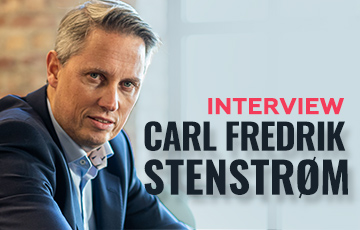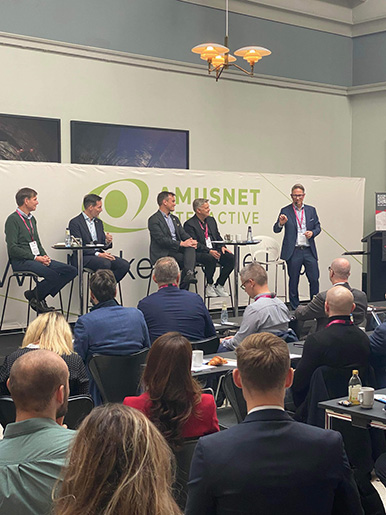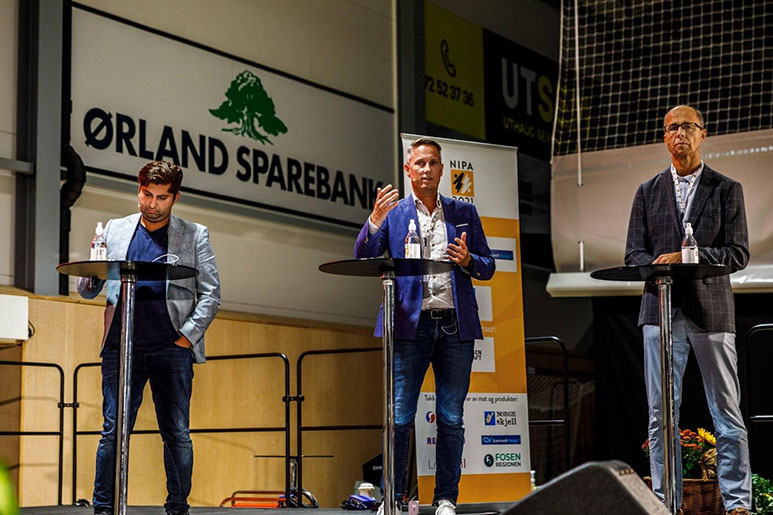«The Norwegian monopoly has failed» — Interview with the Secretary General of the Norwegian Trade association online games Carl Fredrik Stenstrøm

We continue our series of interviews with famous people from the world of casinos and gambling. This time we were able to chat with Secretary General of the Norwegian Trade association online games Carl Fredrik Stenstrøm. Talk about gambling in Norway, find out why the state monopoly on casinos failed, learn how Norwegians bet in the country, where only two state-owned casinos operate, and how much tax revenue the state loses with one of the heaviest regulations in Europe.
– Please introduce yourself and tell us about yourself.
I have been working basically my whole active career in this business, for ATG for 2 periodes, ILTS in the US, but for the most part Norsk Rikstoto in Norway. Commercial director from 2013 – 2019 and also responsible for implementing the RG tools from 2017.
Based in Oslo and spending my whole professional time working for a new strong regulation in Norway where we manage to protect problem gamblers and at the same time have a high channelization.
– You’ve worked for almost 20 years at Norsk Rikstoto, one of the two state-owned casinos in Norway. Tell us about the differences between Norsk Rikstoto and Norsk Tipping.
The main difference between the two is their areas of operation. They have divided the Norwegian market – Norsk Rikstoto offers betting on horse racing exclusively, and Norsk Tipping is responsible for the other betting markets.
But besides that, I think there are cultural differences between them as well. While Norsk Tipping is government protected mainly for ideological and economic reasons, I find that Norsk Rikstoto has a solid foundation in the horse racing community. And I think that’s a good thing for Rikstoto.
– In Norway there is actually a monopoly in the industry. Do you think this stops gambling and betting growth?
All statistics point to the opposite. The Norwegian monopoly has failed, and I strongly believe that the Norwegian people and betting enthusiasts would be better off with an open and regulated market. And on top of that, I think a regulated model would be better for the users, both when it comes to promoting responsible gambling, ensuring innovation and improving the industry cooperation.
According to the Lottery inspection 250 000 Norwegians gamble abroad, we state that number is even higher, there is a leakage of above 4 billion NOK according H2.

– Do you think the Norwegian market is very different from other European countries? In what way?
As Norway is the most heavily regulated market in Norway, there are many differences for sure. But then again, Norwegians are among the most enthusiastic gamblers in the world. The net spending per capita is high, and gambling is part of our culture – in a good way.
Still, that comes with obvious difficulties. I’m really concerned with finding better solutions for Norwegian gamblers and for the entire industry. And I strongly believe that the Norwegian monopoly won’t find the best solutions on their own.
– In Norway there is strict legislation related to gambling. Is it possible to open a casino and get a license?
No, the Norwegian gaming and betting laws prohibit this. At the same time, we have a lot of Bingo-halls in Norway, most of them have Norsk Tipping, Norsk Rikstoto and Bingo – maybe not like a casino but still a place where they only offer gambling products.
– What is the government’s reluctance to give legal status to new casinos? Would it be an unnecessary tax revenue for the government?
They see casinos as unnecessary establishments, and the current government strongly believes that the current state-owned companies offer enough diversity in the market to cater to people’s needs.
– Share your prediction for the future of the industry. Do you think that in 20 years there will be only 2 legal casinos in the country or will the government soften the licensing conditions?
I would be surprised if the shifting Norwegian governments refuse to see the positive aspects of opening up the industry. It would be a benefit both because of tax revenue, but also because the transparency would make it easier to handle irresponsible gambling.
As Norway over the coming years stands more and more alone in its belief in the monopoly model, I’m convinced that the benefits of regulated markets will be evident – even to Norwegian politicians and regulators.
– You pay a lot of attention to the principles of responsible gaming. Can you tell us if that’s okay in Norway?
The Norwegian government believes that we have a good system for responsible gaming in Norway, but I wholeheartedly disagree with their view. If you look at the available research, it unequivocally confirms that problem gambling is on the rise. Our system needs reform, and I hope that the governments realize this in the future.
– Norsk Rikstoto spends a lot of resources on developing procedures and tools to make horse racing safer for players. Tell us more about these procedures.
Norsk Rikstoto has implemented some of the RG tools my members have. The one that causes a lot of discussion even with the politicians is the total loss limit of 20 000 NOK a month. We can see that the turnover has dropped after this implementation. With Norway and Sweden commingling in a lot of the pools thru a week, we find it strange that Swedish and Norwegians are having different limits and that Norwegians compete stricter rules than Swedish players. We embrace the Swedish regulation and that the operator has a responsibility for their customers.

– Do you think the government will soften the laws if everyone understands the principles of responsible gaming and follows them? Or is some other action needed for the laws to change?
There is absolutely need for action. As of now, the problems surrounding the current system are hardly visible, and that is something I work to rectify. Not only to promote a better, regulated model, but because lack of knowledge and awareness of the downsides related to our current model is harmful.
– The current legislation only regulates land-based casinos, while online casinos are unregulated. When do you think the government will take them on and what are the consequences?
There are some regulations regarding online casinos, so the premise of the question isn’t quite correct. However, the debate regarding their regulations is constantly ongoing, with two opposing views. One side wants to open up the Norwegian market, and institute a regulated regime allowing foreign gambling sites to operate. The other side wants to regulate even more. Needless to say, I support the former rather than the latter.
– What gambling games are more popular among Norwegians? Poker, slot machines, sports betting, or lotteries?
Norwegians have a long tradition for participating in gambling, from Lottery-products to sports betting, poker, casino (online) and horseracing and still we have slot-machines in kiosks in Norway. Bingo has a strong tradition as well.
– Are you betting by the way? Probably you prefer horse racing?
I won 21 000 SKR together with my brother and father at Swedish V75 in 1982, I was 11 at the time. Thankfully you have to be 18 years old now.
I place a bet now and then, and Horse racing and sportsbook are the ones I prefer.


